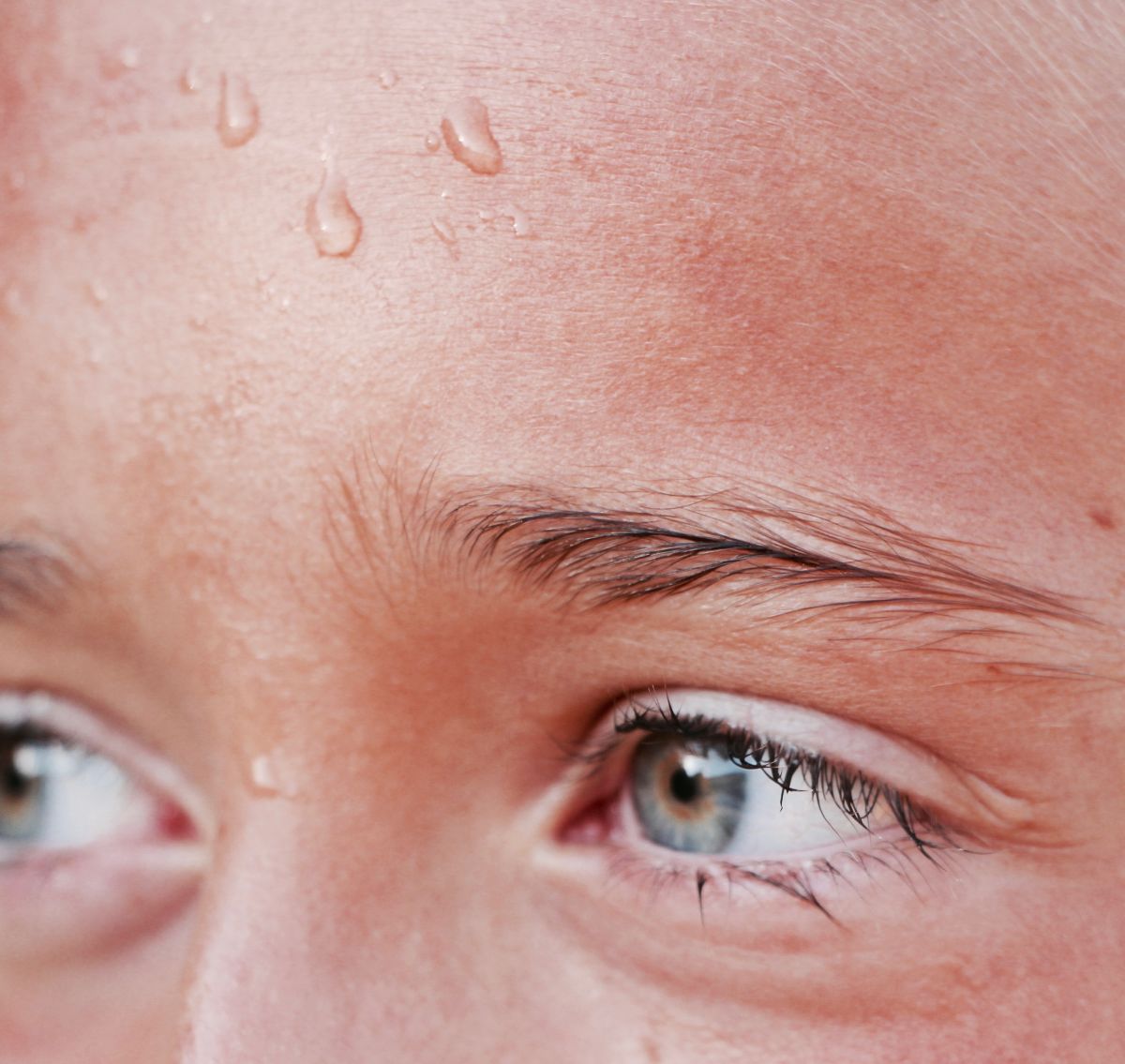Sweating (and Hot Flashes)

Sweating can be a very unwelcome and uncomfortable symptom of pregnancy, but likely plays an important role in the regulation of body temperature as well as sodium and water. A dysregulation of this process can cause complications such as dehydration, electrolyte imbalance, dizziness, and kidney problems.
Excess sweating occurs in the postpartum period to eliminate the 6 to 8 liters of additional fluid the body no longer needs; the dramatic decrease in hormone levels affects body temperature and also leads to postpartum sweating.
Women who notice they are sweating more than normal during pregnancy should increase their fluid intake, as well as fluids with sugar, sodium, and other nutrients to replace any lost electrolytes through sweat, especially during and after exercise (being careful not to over-hydrate).
Women should also mention this symptom to their HCP who can evaluate any other potential causes for excessive sweating such as a hormone imbalance or thyroid concerns.
Background
Overall, there is very limited information regarding why women may sweat more during pregnancy, to include prevalence or best management practices.
Pregnant women can sweat more during physical exercise than prior to pregnancy and even during normal daily activities.
Sweating can affect a pregnant woman’s quality of life, leading to frequent clothing changes, increased antiperspirant use, frequent bed sheet changes, and a change in social activities. Nighttime sweating also occurs during pregnancy and can potentially lead to dehydration, a lack of sleep, and increased fatigue during the day.
Excessive sweating, known as hyperhidrosis, can either occur all over the body or more focalized to certain areas, such as the armpits, back, or groin area.
Causes
While pregnancy itself has been identified as a cause for excessive sweating, the mechanisms for how pregnancy leads to this symptoms are not known.
Due to an increase in blood volume, blood is closer to the skin, and therefore warmer, increasing sweating. Sweating is used as a skin-cooling mechanism; this could be the body's attempts to protect and better regulate body temperature as excess heat is dangerous during pregnancy.
Progesterone also raises body temperature but, interestingly, it lowers the rate of sweating. However, estrogen has the opposite effect, and it is possible that women with more estrogen during pregnancy may be more likely to sweat.
Regarding hot flashes, it estimated a possible quarter of all pregnant women experience at least one, but these episodes are not studied very often, despite their prevalence. Therefore, researchers are not sure why or how hot flashes occur, if an increase in sweating during pregnancy is related to their occurrence, or if they occur through different mechanisms.

Although hormone fluctuations are believed to be the main cause of hot flashes, especially in the postpartum period, there are likely other factors involved since not all women experience these episodes. It is also currently assessed that family history may play an important part in a woman’s risk level for hot flashes/sweating during pregnancy.
Additionally, although the body’s sodium and water relationship during pregnancy is not completely understood, pregnant women do retain a significant amount of fluid, and sweating could be a temporary attempt to get rid of excess fluid or achieve a better balance between extra sodium and/or fluid.
Women should always talk to their HCP about any perceived excessive sweating during pregnancy, as infections, acid reflux, fevers, certain medications, panic attacks, sleep apnea, and conditions involving the thyroid (hyperthyroidism) and pituitary glands can also cause sweating. HCPs may want to rule these out (some of which can be ruled out by only a physical exam/medical history).
Exercise
As stated above, pregnancy can cause women to sweat more during exercise. A lack of hydration during exercise can lead to dehydration, a serious complication during pregnancy. This risk further increases with exercise in hot environments.
Thirst is not the best predictor of dehydration and pregnant women need to make sure they are drinking enough fluids during and after exercise depending on their level of exertion and fluid loss (read Exercise for more information).
Postpartum
Women are more likely to sweat after delivery as hormones return to pre-pregnancy levels and the body eliminates the extra fluid (6 to 8 liters worth). This is also manifested through increased urination as well in the first few weeks.
Action
Women who notice they are sweating more than normal during pregnancy should increase their fluid intake, as well as fluids with sugar, sodium, and other nutrients to replace any lost through sweat.
Women should also mention this symptom to their HCP who can evaluate any other potential causes for excessive sweating such as a hormone imbalance or thyroid concerns.

For better management, women should consider:
Sleeping on breathable sheets made of cotton
Not sleeping on a towel; while the towel can keep sheets from getting wet, towels are heavy-weight fabrics that do not let air through and can cause a woman's back or side to sweat even more (i.e. the sleeping area is too hot)
Wearing all-cotton clothing when possible (t-shirts, etc.); denim and polyester can trap heat and will not absorb sweat (the cooling effect comes when the sweat evaporates
Cotton, breathable maxi/sundresses which can help keep the entire body cool
Taking multiple clothes/outfit changes to work or in the car; women who commute to work can keep a tank top on in the car, and put their shirt on once they arrive to work (in the parking lot); this can help avoid underarm/back sweat while driving
Remaining in air conditioned rooms as much as possible
Keeping a battery-powered or small motorized fan at their workstation
Staying hydrated as much as possible, even sipping ice cold water throughout the day (women should also be sure to avoid over-hydration).
Reading Heat Exposure to better understand how heat can affect the pregnant body.
Women should also consider sharing and submitting their experience below regarding sweating/hot flashes during pregnancy. This can help other women learn additional perspectives regarding this concern and how to potentially manage symptoms.
Resources
Exercise During Pregnancy (American College of Obstetricians and Gynecologists)
Thyroid Disease (American College of Obstetricians and Gynecologists)
Prospective Evaluation of Hot Flashes during Pregnancy and Postpartum (Fertil Steril, 2013)